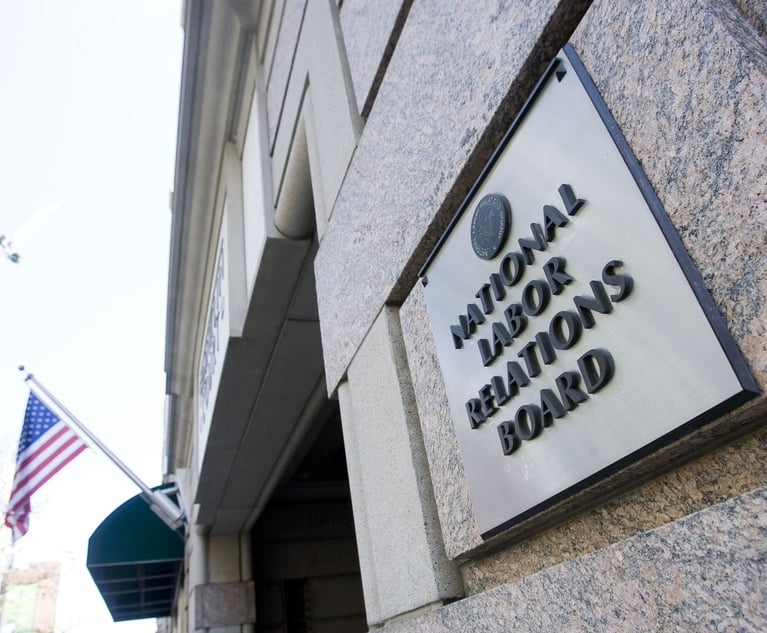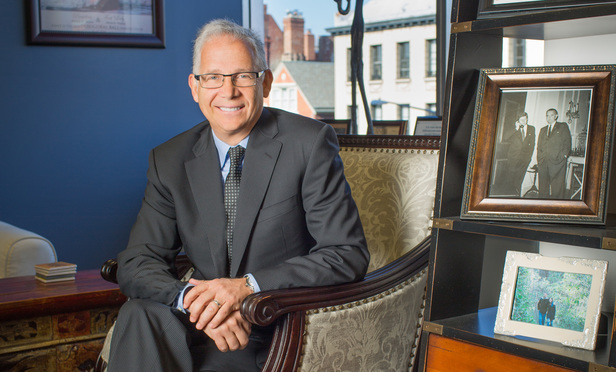Should Big Law Be Afraid of David Sanford?
The Sanford Heisler name partner says his sex discrimination suit against Chadbourne & Parke is the strongest gender bias case he's ever brought.
September 13, 2016 at 04:38 PM
5 minute read
This article has been updated.
David Sanford, the Sanford Heisler name partner who made his name lobbing bias lawsuits at Fortune 500 companies, invited me to his office in midtown Manhattan last week for a little chat.
We were 10 minutes into our conversation about his latest client, Kerrie Campbell, the Chadbourne & Parke partner suing the firm for gender discrimination, when he laced into me: “What you wrote was a disservice!”
He was talking about my recent post, So You Want to Sue Your Firm, about the pitfalls of suing a law firm or company for discrimination. I had suggested that there's hell to pay if you sue your firm, since the process can leave people isolated, with few job prospects. (Not that there aren't some winners: Sanford's firm broke records with a $253 million sex discrimination verdict against Novartis A.G. in 2010. The case later settled for $175 million.)
Admittedly, the piece was a bit of a downer. It didn't lift my spirits to think that standing up to employers might force victims of harassment or discrimination to give up their chosen careers. So if Sanford wanted to challenge my conclusions, that was fine with me.
Here are excerpts of my meeting and follow-up phone conversation with Sanford:
You got on my case for being too pessimistic about suing firms for discrimination. How would you have written the article?
Let's applaud people who have the courage to right wrongs and effectuate change. These are people who feel they've been wronged, want compensation for the wrong and want the system changed.
That sounds noble, but what about the personal cost of bringing a lawsuit? What about the risk that the litigation can drag on and that you ultimately won't succeed?
There are risks in everything. You can go a dentist for a root canal and something can go wrong but that doesn't mean you don't go. Look, 80 percent of the cases we take on settle, and people are happy with the result. Very few go to trial.
So why hasn't this case settled? You'd think a big law firm would do everything to prevent airing the mess about how partners are paid and fired.
Maybe [Chadbourne] thought we wouldn't file. But if they think that about me, they didn't do their homework.
How did you decide to take this case?
I like Kerrie a lot and I'm confident that the jury will find her compelling. I only take 5 percent of the cases that come my way. We only take the ones we're prepared to take all the way to trial.
You say that Kerrie Campbell's case is a typical gender discrimination case. How does it compare with others you've seen?
It is the strongest I've seen. It is strong on numbers, strong on witnesses and strong on documents. We say there is discrimination based on gender because there's no other reason for [men and women] who are similarly situated to be paid differently. [Campbell asserts in her claim that she billed more than $5 million since she lateraled into the firm in 2014 but was paid less than men who generated far less revenue.] If you don't track compensation to revenue generated, what are you tracking it on? There are only so many objective factors to consider: hours billed, collectibles, collections and origination. I don't think these cases are complicated.
With partners, you can look at what they've generated as a measure. But what about associates whose only record is their performance reviews? Do they have a hell's chance of claiming gender discrimination?
It is tougher. Firms will say they make decisions about year-end bonuses and promotions based on billables and quality of work—and quality is subjective.
Kerrie is still at the firm?
Yes. She's doing work, doing appeals. She's a hard worker. There are uncertainty and challenges. She's really strong.
It must be weird to work at a firm that you are suing. Do people speak to her?
Not much.
And what do you think of that letter to you from 14 female partners at Chadbourne telling you off—that you don't speak for them in this class action lawsuit?
It is notable that the women do not contest the underlying allegations of gender discrimination. Other partners and associates have contacted us with support.
What advice do you have for people who are thinking of suing their firms? Should they be prepare to kiss Big Law goodbye for a new life?
Most people in law are like lemmings. They go to good schools, go for the prized big firm jobs and think—in a profoundly wrong way—that it's the only context to be a lawyer.
The typical story in this situation is that a person takes a courageous stand and discovers there's another world. People write me that they're much happier out of big law firms.
The reality is that it's a big world. And you don't have to work at Chadbourne to be happy.
Contact Vivia Chen at [email protected]. On Twitter: @lawcareerist.
This content has been archived. It is available through our partners, LexisNexis® and Bloomberg Law.
To view this content, please continue to their sites.
Not a Lexis Subscriber?
Subscribe Now
Not a Bloomberg Law Subscriber?
Subscribe Now
NOT FOR REPRINT
© 2025 ALM Global, LLC, All Rights Reserved. Request academic re-use from www.copyright.com. All other uses, submit a request to [email protected]. For more information visit Asset & Logo Licensing.
You Might Like
View All
Class Action Claims Amazon's Point-Based Attendance Policy Is Discriminatory, Suit Says
3 minute read
Trump Fires EEOC Commissioners, Kneecapping Democrat-Controlled Civil Rights Agency

Trump’s Firing of NLRB Member Could Spark Review of Supreme Court Precedent

Testing Legal Authority, Trump Fires NLRB Member, Leaving Panel Without Quorum
3 minute readTrending Stories
- 1The Law Firm Disrupted: Scrutinizing the Elephant More Than the Mouse
- 2Inherent Diminished Value Damages Unavailable to 3rd-Party Claimants, Court Says
- 3Pa. Defense Firm Sued by Client Over Ex-Eagles Player's $43.5M Med Mal Win
- 4Losses Mount at Morris Manning, but Departing Ex-Chair Stays Bullish About His Old Firm's Future
- 5Zoom Faces Intellectual Property Suit Over AI-Based Augmented Video Conferencing
Who Got The Work
J. Brugh Lower of Gibbons has entered an appearance for industrial equipment supplier Devco Corporation in a pending trademark infringement lawsuit. The suit, accusing the defendant of selling knock-off Graco products, was filed Dec. 18 in New Jersey District Court by Rivkin Radler on behalf of Graco Inc. and Graco Minnesota. The case, assigned to U.S. District Judge Zahid N. Quraishi, is 3:24-cv-11294, Graco Inc. et al v. Devco Corporation.
Who Got The Work
Rebecca Maller-Stein and Kent A. Yalowitz of Arnold & Porter Kaye Scholer have entered their appearances for Hanaco Venture Capital and its executives, Lior Prosor and David Frankel, in a pending securities lawsuit. The action, filed on Dec. 24 in New York Southern District Court by Zell, Aron & Co. on behalf of Goldeneye Advisors, accuses the defendants of negligently and fraudulently managing the plaintiff's $1 million investment. The case, assigned to U.S. District Judge Vernon S. Broderick, is 1:24-cv-09918, Goldeneye Advisors, LLC v. Hanaco Venture Capital, Ltd. et al.
Who Got The Work
Attorneys from A&O Shearman has stepped in as defense counsel for Toronto-Dominion Bank and other defendants in a pending securities class action. The suit, filed Dec. 11 in New York Southern District Court by Bleichmar Fonti & Auld, accuses the defendants of concealing the bank's 'pervasive' deficiencies in regards to its compliance with the Bank Secrecy Act and the quality of its anti-money laundering controls. The case, assigned to U.S. District Judge Arun Subramanian, is 1:24-cv-09445, Gonzalez v. The Toronto-Dominion Bank et al.
Who Got The Work
Crown Castle International, a Pennsylvania company providing shared communications infrastructure, has turned to Luke D. Wolf of Gordon Rees Scully Mansukhani to fend off a pending breach-of-contract lawsuit. The court action, filed Nov. 25 in Michigan Eastern District Court by Hooper Hathaway PC on behalf of The Town Residences LLC, accuses Crown Castle of failing to transfer approximately $30,000 in utility payments from T-Mobile in breach of a roof-top lease and assignment agreement. The case, assigned to U.S. District Judge Susan K. Declercq, is 2:24-cv-13131, The Town Residences LLC v. T-Mobile US, Inc. et al.
Who Got The Work
Wilfred P. Coronato and Daniel M. Schwartz of McCarter & English have stepped in as defense counsel to Electrolux Home Products Inc. in a pending product liability lawsuit. The court action, filed Nov. 26 in New York Eastern District Court by Poulos Lopiccolo PC and Nagel Rice LLP on behalf of David Stern, alleges that the defendant's refrigerators’ drawers and shelving repeatedly break and fall apart within months after purchase. The case, assigned to U.S. District Judge Joan M. Azrack, is 2:24-cv-08204, Stern v. Electrolux Home Products, Inc.
Featured Firms
Law Offices of Gary Martin Hays & Associates, P.C.
(470) 294-1674
Law Offices of Mark E. Salomone
(857) 444-6468
Smith & Hassler
(713) 739-1250









